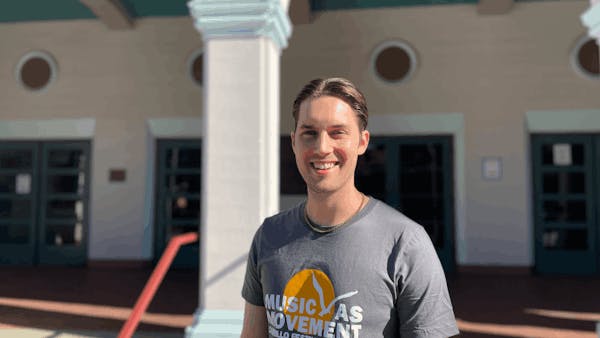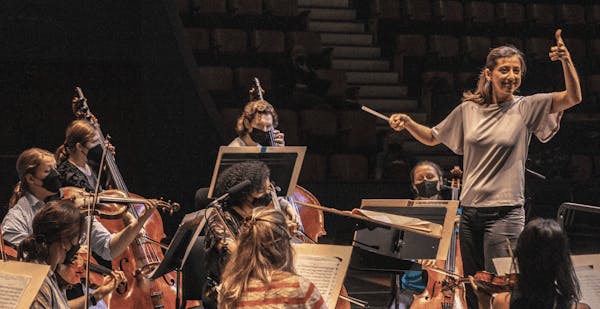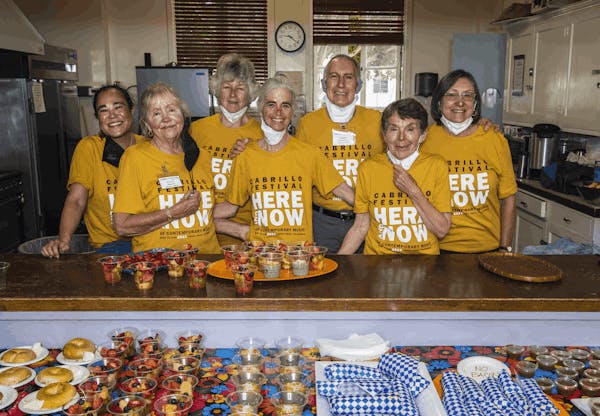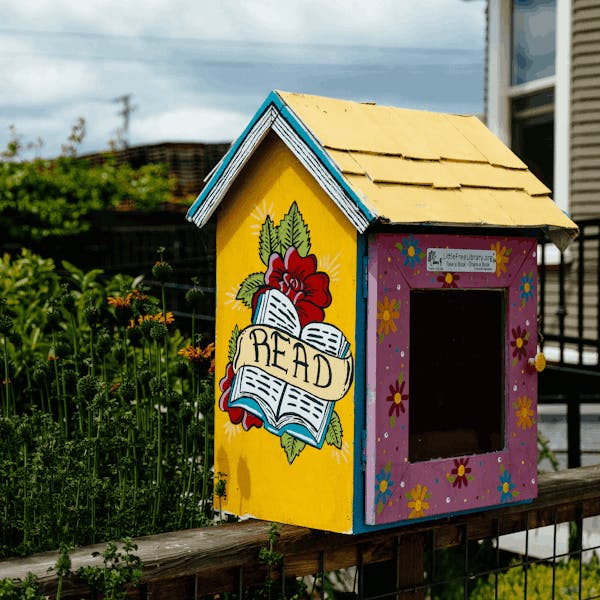Act Now
This giving season presents a unique opportunity to strengthen the place we call home. And this year, there's added reason to act.

ARTS & CULTURE COMMUNITY GRANTEE SPOTLIGHT
Orchestrating Sacred Space
This article is part of our “Play On! – Celebrating New Leaders in Arts & Culture” series of five articles featuring interviews with new executive and managing directors at the helm of beloved arts organizations in Santa Cruz County. All the featured organizations are recipients of 2024 Community Grants. Read the full series.
Header photo: D. Riley Nicholson, Executive Director of the Cabrillo Festival of Contemporary Music on the steps of the Santa Cruz Civic Auditorium where the festival takes place.
When asked to share more about the theme of this year’s Cabrillo Festival of Contemporary Music—Music as Movement—Executive Director D. Riley Nicholson lights up and shares: “I got to take a big step back and look at the programmatic vision of our brilliant artistic director Cristi Măcelaru and ask curatorially, what are the common threads?”
What emerged for Riley was the word “movement” and the multiple definitions it encompasses. He explains, “There are pieces that center stories of refugees and pieces about immigration and migration. We have new music about social movements, including women’s suffrage. And there are pieces that move between different styles, cultural heritages, and time periods.”

A Transformational Experience
This year’s theme is particularly fitting for a festival whose very mission is leading a movement to “transform the orchestral experience for artists and audiences by building a vibrant community dedicated to the creation and performance of profound, relevant, and innovative music.”
In addition to a career in arts management, Riley is a composer and pianist himself, so he is quite familiar with the often formal, regimented, and hierarchical culture of traditional orchestras. For example, Riley explains, “A lot of times when an orchestra commissions a composer, the composer might be welcome to one rehearsal, can only speak if the conductor looks at them, and they aren’t to address musicians of the orchestra directly.”
But when the Cabrillo festival commissions a piece, the composer is welcomed into the fold. Some of the composers, through the new Creative Lab program, are even invited to design the entire experience of the piece. He says, “The festival is so much more than a concert, right? It’s the open rehearsals and artist talks and truly inviting the whole community in to understanding how the art form is living and breathing—not something to be kept at a distance.”

The Warmth of Welcome
That sense of welcome naturally translates to the composers, musicians, and artists, and Riley believes it’s a uniquely local Santa Cruz phenomenon. “The whole festival is a community embrace—the warmth and atmosphere we create spills over into overall access to the creative process.”
Riley notes that his predecessor, Ellen Primack—who led the festival for 33 years and is still an active mentor for him—was the protector of that environment which she called “sacred space.” He says, “Ellen built and sustained that sacred space. It doesn’t just magically happen. It’s intentional and it’s my job to continue nurturing it.”
But space, Riley says, is only sacred if it’s truly open to all. He’s continuing to build on Ellen and the Board’s commitment to equity. Riley and Cristi are also proud to continue the legacy of a 50/50 gender representation in the programming built over the years by Ellen and Artist Director Laureate, Marin Alsop, which he notes is surprisingly rare in symphony orchestras. “Equity goes far beyond programming, though. It’s the actual model of the organization, how you support artists and treat them. One of the steps the festival has taken is to increase travel compensation. We want to reduce barriers to musicians participating.”
Cross Pollination & Partnerships
The festival’s commitment to equity includes reaching new audiences through what he calls “cross pollination” and community partnerships. To increase the depth of conversations around the music, the festival collaborates with local artists, nonprofits, and educators. For example, one of this year’s orchestral compositions is inspired by mariachi music; an after-performance celebration will feature a live mariachi band and folklorico dancers from local nonprofit Esperanza del Valle. Riley recognizes that the festival is only two weeks of the year, “so we’re focused on using our voice and power to celebrate our partners and build deeper connections in the community.”
In these increasingly divisive and challenging times, Riley emphasizes the importance of the arts and especially funding for the arts. “I’m not going to pretend that an orchestra can solve climate change, for example. But what the arts can do is change culture, and that can change everything. It’s a long game, and the arts have a vital role in celebrating diverse voices, ideas, and bringing us together in the ways that matter most.”
Learn more about how you can support local arts & culture through your donor-advised fund.
Connect with Hilary Bryant, Donor Services Director

